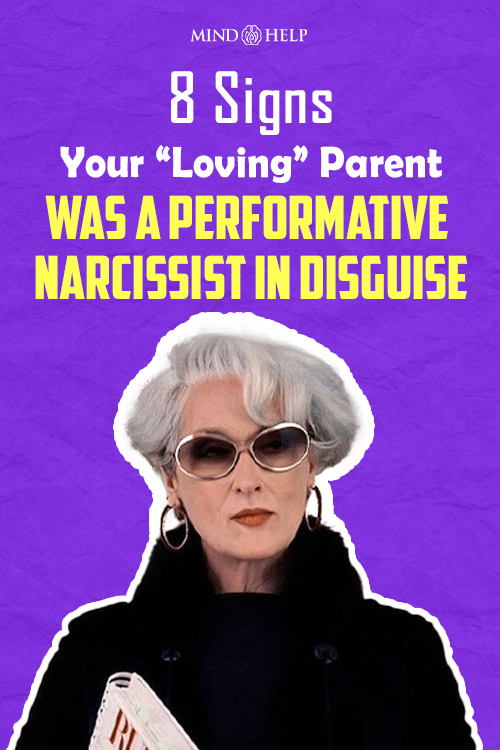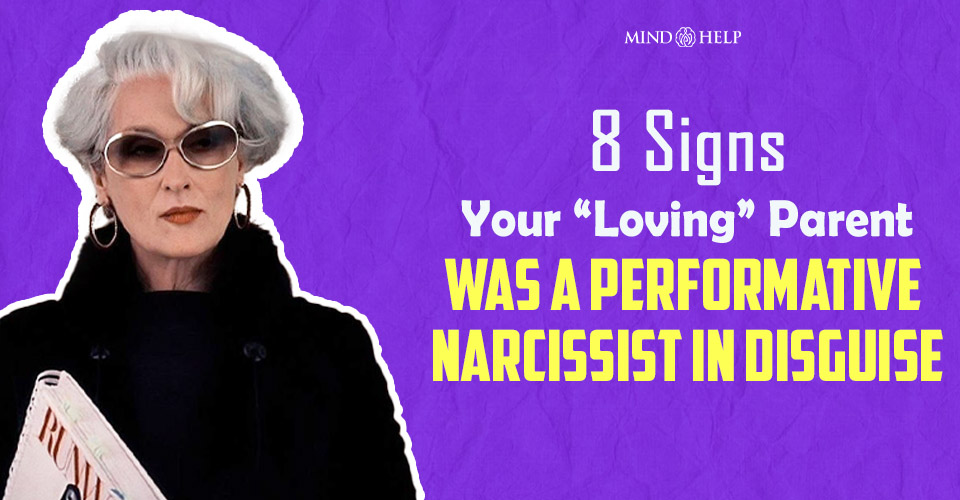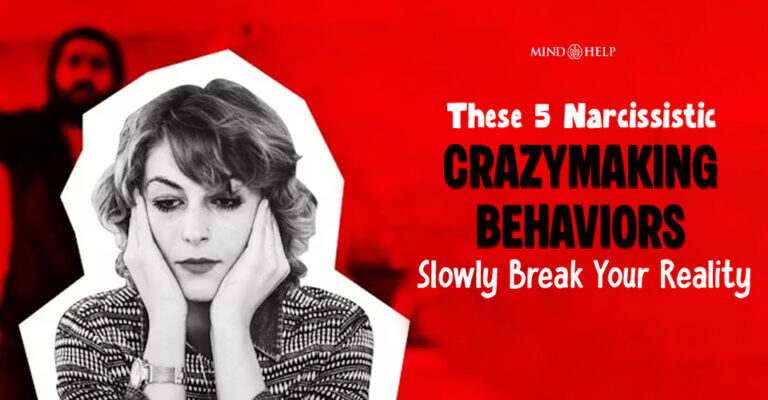If a performative narcissist raised you, you probably felt that strange childhood tension, like things looked perfect from the outside but never quite felt right on the inside. That’s the trap of performative narcissism: a parent who nails the act of love only when there’s an audience watching.
This isn’t the loud, obvious kind of narcissism. Their whole identity leans on polished performative empathy, making this narcissistic parenting style one of the hardest to recognize. Outsiders see a saint. You saw the cracks.
Today, we are digging into the confusing traits of a narcissist parent, the subtle signs of a narcissistic parent you probably normalized, and why so many adult children only understand what happened years later.
Related: 5 Signs You Are Experiencing Emotional Possession (And How to Reclaim Your Power)
What Is Performative Narcissism?
Performative narcissism is when someone’s entire identity is shaped around how impressive, kind, selfless, or “perfect” they appear to others. Unlike the loud overt narcissist or the brooding covert narcissist, a performative narcissist performs goodness.
They master performative empathy, which can be defined as a polished emotional act that only exists when someone else is watching.
To the world, they look like saints. However, behind closed doors, they can be cold, critical, manipulative, or emotionally unavailable.
This contradiction is exactly why kids raised by them often grow up confused, anxious, or constantly trying to “earn” real love.
Why Performative Narcissists Are the Rarest Type?
A real performative narcissist is rare because they are basically emotional actors – the kind who study people the way others study movies. They know exactly how empathy should look, so they copy it with scary accuracy.
And how do they look outside? Charming, generous, saint-level “good.” Behind the scenes? Ice-cold.
You will usually find this type in families where reputation is oxygen. They don’t just want to be admired, they want to be admired for being the best person in the room. And that’s what makes their narcissistic parenting style so confusing.
They never slip in public. The damage only happens where no one’s watching, leaving you with a truth no one else ever saw.
8 Signs You Were Raised by a Performative Narcissist
1. Their love was performance, not a feeling.
This is one of the major signs of performative narcissism.
A performative narcissist knows exactly how to act warm and loving when an audience is present, just like Mother Gothel in Tangled, who treats Rapunzel like royalty in public but coldly controls her in private.
This is a classic sign of performative empathy, where affection is a show, not a truth. Children raised in this narcissistic parenting style often feel emotionally starved and empty, even though outsiders think they are “so lucky” to have such a hands-on parent.
2. They were perfect in public, and emotionally absent at home.
They portrayed themselves as the ideal parent, much like Lucille Bluth in Arrested Development, who played the role of the sophisticated, responsible mother while sabotaging her children behind closed doors.
Performative narcissists are always hungry for public admiration but avoid emotional labor behind closed doors.
This contradiction always confused you, and is one of the most painful signs of a narcissistic parent. You never knew which version of them you would get.

3. You were used as a prop for their image.
Your achievements became their photo-op moments, similar to Amy Elliott Dunne’s parents in Gone Girl, who turned their daughter into a brand to boost their public image.
Performative narcissists use their children like accessories: trophies when they are shining, burdens when they are struggling. This sort of narcissistic parenting style makes kids feel valued only for how good they make the parent look.
4. They weaponized good deeds to control you.
Like Eleanor’s mom in The Good Place, who acted wonderfully selfless in public while guilt-tripping her daughter privately, performative narcissists use kindness as emotional currency.
Every “good deed” becomes a lifelong reminder of how much they have “done for you.” Their acts of generosity are rarely sincere; they are strategic. This mix of manipulation and performative empathy is one of the major traits of a narcissist parent.
Related: The Hidden Link Between Chronic Sadness and Narcissistic Abuse
5. They took credit for your talents but blamed you for their failures.
When you succeeded, they portrayed themselves as the mastermind and reason behind your success, much like Logan Roy in Succession, who constantly took credit for his children’s wins while quietly pushing all failures back onto them.
However, when things went wrong, all the blame fell on your shoulders, and you conveniently became the family disgrace.
This double standard is one of the core signs of a narcissistic parent and one that deeply affects your sense of identity and self-esteem.
6. They had outbursts only when there was an audience.
Performative narcissists never explode or show their anger randomly; you will notice that they always explode strategically. Think Cersei Lannister in Game of Thrones, who unleashes emotional theatrics whenever she needs sympathy or political advantage.
Your parent may have cried dramatically when guests were around or scolded you loudly when they knew people were listening. This spotlight-fueled behavior is a classic sign of a performative narcissist.
7. They showed performative empathy instead of real support.
They always said the “right” things, but only when there was an audience.
Think of those This Is Us moments where Randall’s mother may sound comforting, but you can clearly feel that she is simply behaving in a way a “good parent” should behave, instead of how she actually feels.
Their empathy comes off as rehearsed, as if they are performing tenderness instead of offering it. Children growing up in an environment like this don’t trust kindness because they have seen how easily it gets used as a prop.
8. They changed history as per their convenience to protect their reputation.
If you confronted them, chances are they will claim that you misremembered – a classic tactic seen in characters like Regina George’s mother, June George in Mean Girls, who distorts reality to stay “the cool mom.”
Performative narcissists will rewrite events, shift blame, or deny things entirely if it threatens their social image. For children, this creates lifelong doubt about what actually happened.

How Can You Heal This?
- Stop over-explaining: Performative narcissists don’t want clarity, they want control. So, try to keep your responses short so they have less material to twist.
- Detach from their image-management: Their need for admiration is their burden, not your responsibility. Mentally step back when they pretend to be good.
- Journal events in real-time: This helps rebuild your internal reality and protects you from subtle gaslighting and rewritten history. It helps you stay in touch with what’s actually happening, instead of believing a manufactured reality.
- Respond, don’t react: A 3–5 second pause before replying can help you break your childhood conditioning and also helps you keep your emotions in control.
- Use “calendar boundaries”: Schedule calls, visits, and any sort of interaction, instead of allowing spontaneous access to your time and energy.
- Practice self-celebration: Since they stole credit for your successes, work on and rebuild yourself by acknowledging even small wins privately and intentionally.
- Lower emotional expectations: Don’t expect empathy and understanding from them; instead, measure them by their actions, not their charming words.
- Grey rock can be your best friend: Be calm, aloof, and only give neutral responses to help put an end to their drama and greed for attention (melodramatic and emotional theatrics).
- Practice nervous-system resets: Use grounding techniques (breathwork, cold water, EMDR taps) to unhook your body’s stress response to their moods.
- Try not to be vulnerable: Share only what they can’t weaponize, and try to keep emotional conversations light, aloof, factual, and low-risk.
Related: What Is Emotional Banking? 5 Signs It’s Manipulation Disguised as Kindness
Takeaway
If your childhood felt like living on a stage, now you finally know why. The performance was never yours. The second you name the pattern, you take back the script.
And always remember, that you are not broken, you are waking up. And from here on, you get to live real, not rehearsed.








